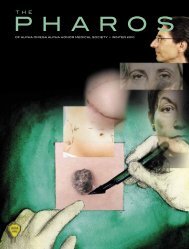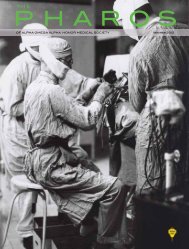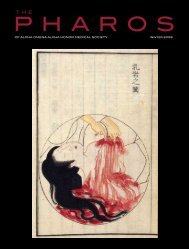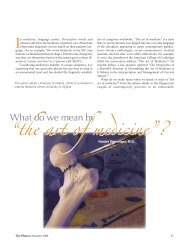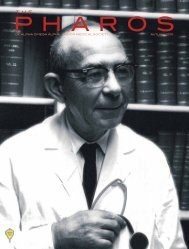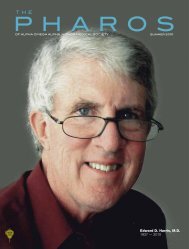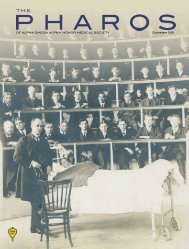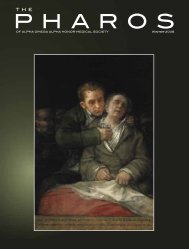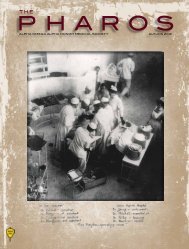Download The Pharos Winter 2011 Edition - Alpha Omega Alpha
Download The Pharos Winter 2011 Edition - Alpha Omega Alpha
Download The Pharos Winter 2011 Edition - Alpha Omega Alpha
Create successful ePaper yourself
Turn your PDF publications into a flip-book with our unique Google optimized e-Paper software.
����<br />
Political violence and the physician<br />
Amanda J. Redig, MD, PhD<br />
<strong>The</strong> author (AΩA, Northwestern University, 2010) is a<br />
resident in the Department of Medicine at Brigham and<br />
Women’s Hospital in Boston. This essay won second prize<br />
in the 2010 Helen H. Glaser Student Essay Competition.<br />
Human health in the early days of a new millennium<br />
stands at the crossroads of a paradox: thanks to a vast<br />
increase in knowledge and technology, we are more<br />
effective than ever before in both the saving and the taking of<br />
lives. Indeed, the twentieth century is characterized by two<br />
incongruous realities. On the one hand, we have the hope and<br />
optimism generated by groundbreaking strides against the suffering<br />
caused by disease. Yet coupled to such progress is the<br />
dark legacy of genocide, war, and political violence on a scale<br />
previously unimaginable. What makes reconciling these two<br />
competing visions so difficult for the medical profession is the<br />
fact that physicians have been instrumental in advancing not<br />
only the achievements but also the atrocities.<br />
Decades after their deaths, physicians such as Jonas Salk<br />
or Alexander Fleming remain household names because of<br />
the effect their work has had on the advancement of medicine’s<br />
ability to heal. In contrast, there are also physicians<br />
whose names have become synonymous with the very worst<br />
of humanity, such as the “Angel of Death,” Dr. Josef Mengele.<br />
Fortunately, there are far more famous than infamous physicians,<br />
but no matter how much the medical profession may<br />
wish to think otherwise, the physician who chooses to embrace<br />
death over life is not an anomaly.<br />
<strong>The</strong> list of physicians who have participated in and furthered<br />
political violence is extensive. Nazi physicians directed<br />
the mass murder of the weak, the ill, and the disabled in 1930s<br />
Germany, as well as the horrific medical experiments of Nazi<br />
World War II concentration camps. Japan’s World War II<br />
Project 731, led by Dr. Shiro<br />
Ishii, killed thousands of POWs<br />
and Chinese and Soviet citizens<br />
in experiments on germ warfare<br />
and vivisection. Among other<br />
historic firsts, including leadership<br />
of the first organization<br />
to use hijacked airliners as a<br />
political tool, Palestinian pediatrician<br />
George Habash was also<br />
responsible for orchestrating a<br />
rocket attack on a bus full of<br />
children in which nine passen-<br />
Major Nidal Hasan<br />
HO/Reuters/Corbis<br />
gers died. Out of the violence that turned neighbor against<br />
neighbor in the former Yugoslavia, psychiatrist Radovan<br />
Karadzic is currently standing trial in the Hague for his role<br />
in the massacre of Bosnian Muslims at Srebenica and the<br />
Siege of Sarajevo. Al-Qaeda counts numerous physicians as<br />
operatives, from number two Ayman al-Zawahiri to the individuals<br />
responsible for the failed suicide bombing at Glasgow<br />
International Airport in 2007. Most recently, Fort Hood<br />
psychiatrist Major Nidal Hasan was responsible for the worst<br />
attack of terrorism on a domestic U.S. military installation in<br />
American history.<br />
Clearly, incongruity aside, physicians are not exempt from<br />
participation in the most chilling of crimes against humanity.<br />
Despite the repugnance with which most physicians view<br />
such actions on the part of their colleagues, the fact remains<br />
that politically-motivated violence perpetrated by physicians<br />
happens far too often, across all lines of politics, religion,<br />
and ethnicity. <strong>The</strong> questions to be asked are thus far more<br />
complex than whether or not a profession built on the best of<br />
intentions can exist side by side with great evil. Instead, the<br />
<strong>The</strong> <strong>Pharos</strong>/<strong>Winter</strong> <strong>2011</strong> 17



